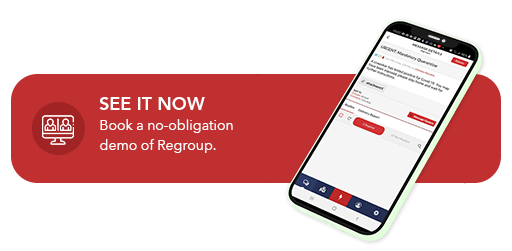
Overcoming Internal Communication Challenges in the Enterprise
Learn how you can improve team communication throughout your enterprise and overcome common but important challenges in Part 1 of Regroup’s Enterprise in Focus Series.
In virtually any industry, effective internal communication is the backbone of a productive and profitable enterprise. Common communication challenges can create issues that intensify over time, resulting in employee dissatisfaction, missed opportunities, increased operating costs with a direct impact on bottom lines. For these and other reasons, it’s crucial for organizations to hone their communication efforts, identify weaknesses and make adjustments so the entire enterprise is communicating effectively.
Since 2006, Regroup Mass Notification has been providing our clients with communication solutions for both emergency alerts and everyday business. And, with our fully dispersed workforce, we’ve learned a thing or two about communicating effectively to support our company’s mission. With clients from higher education to healthcare and manufacturing to financial services, we can identify the most common communication challenges facing industries of all varieties and sizes.
In this four-part series focusing on enterprise communications, we’ll share our experiences and tips for improving day-to-day communications and implementing emergency alert plans for shared workplaces and remote workforces.
Your workforce is a team and for teams to operate in harmony, there must be ample and clear communication from the team leader. When goals, objectives and expectations are not shared in a clear, concise manner, employees will quickly become dissatisfied and at worse, disinterested in their role. When not included in the conversation, many employees will feel less valued.
This means management must recognize that communication is a direct indicator of the organization’s overall health and lead by example. Establishing a culture of open and sensible communication doesn’t have to be a great undertaking when you start with a common sense approach.
 Audit Your Current Communication Plan
Audit Your Current Communication Plan
If you haven’t already identified weaknesses and potential problem areas in your communication plan, it’s a good idea to do a full audit to gain actionable insights. Start with a simple breakdown of what’s already in place:
How is management communicating with team members?
How often?
Is feedback encouraged?
What tools are used?
Can tools be improved?
Are expected results being realized?
Most of us have become quite accustomed to using emails and team chat tools to interact with our team members. However, much can be lost in translation and — in some instances — a simple phone call may be a more effective means to convey an important message.
The goal is to be more flexible so that a higher level of effectiveness can be achieved throughout the entire organization.
Fatigue – the Struggle is Real
Another hurdle many organizations may encounter is fatigue. Simply put, when employee inboxes are constantly at capacity, emails are lost and some important communications may go overlooked.
If your organization relies on email alone to convey important business communications, you may be unnecessarily fatiguing your recipients. Consider alternatives like one-on-one chats, text messaging or a quick call, depending on which method is most appropriate and effective. Before sending an email, ask yourself if the subject matter could be just as effectively communicated with a conversation.
Resistance to Technology
A number of studies have indicated that unfamiliar technologies can foster discomfort and reluctance for the end-user. This means that, whatever methods of communication your organization uses, it’s critical to onboard and train each end-user and team member so adaptability is successful.
According to Statista, over 80% of the world’s population owns and uses a smartphone. And, with more employees working remotely, messaging can often be an effective and accountable method for communicating. Used as a complement to more traditional means of communication (such as email and bulletin boards), direct messaging via a mobile app can grab attention more readily.
 Establishing the Open Door
Establishing the Open Door
As managers and team leaders strive for successful communications, it’s vital to solicit feedback from our reports and team members. Establishing an open door policy can be an easy way to ensure your team members feel comfortable expressing concerns and are contributing ideas for improvement.
Going beyond the typical department meeting and scheduling time (or simply making time) for one-on-one calls and interaction gives team members more ownership over the department’s success. It encourages transparency and helps all concerned stay informed of projects and expectations. Letting your team know you are open to their input is important in establishing trust and developing the type of teamwork that drives success.
Get the Right Tools for the Job
If, after having closely examined your organization’s communication strategy, you find your current tool set lacking, make the needed changes.
There are numerous means of achieving your communication goals; such as chat apps, platforms like Microsoft Teams, corporate intranets or alerting systems like Regroup. It’s beneficial to explore the possibilities and solicit input from your entire organization as to their previous experiences.
Regroup provides the state-of-the art platform for critical and everyday alerts that integrates with a number of popular tools. Our mass notification system can deliver to email, text/SMS, intranets, mobile devices, landlines and more. And, we provide integrations into a number of platforms that allow end-users a familiar and easy-to-use environment for communicating.
Your Next Steps
We invite you to schedule a quick, no-hassle demonstration of the Regroup Mass Notification platform to learn how your organization can improve internal and external communications during emergency situations or day-to-day operations. Click below to get started.
Table of Contents
Categories
- Regroup Product Guides
- Disaster Recovery
- Employee Safety
- Routine Communications
- Mass Notification
- Critical Event Management
- Emergency Preparedness
- Corporate
- Insurance
- Business Continuity
- Business
- Education
- Uncategorized
- Nonprofit
- Healthcare
- Hospitality
- Government & Public Services
- Our Clients
- Awards
- COVID-19
- Safety & Preparedness
- Announcements
 Audit Your Current Communication Plan
Audit Your Current Communication Plan Establishing the Open Door
Establishing the Open Door